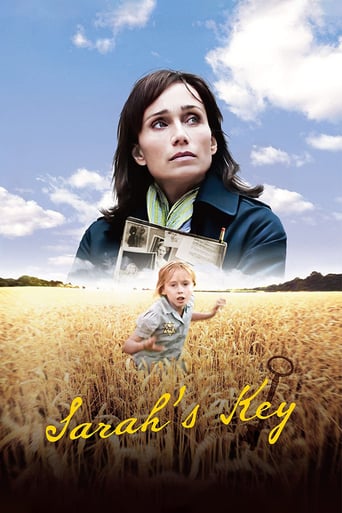SnoopyStyle
Julia Jarmond (Kristin Scott Thomas) is refurbishing her in-laws' Paris apartment after her mother in-law left for assisted living. The apartment comes with a history and she wants to write about it for her magazine. Her husband's grandparents took over the apartment after the Starzynskis. In 1942, the police are gathering all the Jews into the Vélodrome d'Hiver. Sarah Starzynski locks her brother Michel in the closet and promises to return later as the family is taken by the police. She is separated from her parents. She escapes, loses her friend Rachel, finds salvation with the Dufaures, and desperate to return to her brother. In the present day, Julia's uncovering of the past causes friction within the Tezac family. Her pregnancy is causing a rift with her husband. Her investigation leads to William Rainsferd.Sarah's story is horrific and heart-breaking. It is intense. The present day story is less compelling even with the pregnancy. It should connect to the past much more directly. Julia should be searching for the transit camp that leads directly to Sarah in the camp. Julia should find the Dufaures which leads directly to Sarah being saved by them. In short, the two timelines should be connected directly. Honestly, the present day is only interesting for what Julia finds about Sarah and its own melodrama sorta drags. This is all about Sarah for me and it would be great to have more of her story.
mmmarks
I side with those who rate this film very highly, and find those who argue more negatively to be unconvincing. I'm glad to read in some of the other reviews that the novel upon which this film is based is quite wonderful. But please don't let that opinion become a stick with which to beat up a very good film in its own right. (I knew nothing about the novel before watching the film; I didn't find the jumps in time at all confusing—by now such editing has become commonplace and allows us to see connections that would otherwise be much more obscure.) Furthermore, the objections to the modern-story you will read in some user reviews miss the point. Of course it is "flatter" than the story of what happens to Sarah during WWII and after. How could it not be? But that is a necessary dramatic technique. The reporter becomes obsessed by a need to find out more and more—to follow Sarah's story wherever it must take her; and in doing so, she finds a way to cope with problems in her personal life, and she is recaptures a terrible chapter in history that is almost impossible to imagine. The further we get from the time WWII and the holocaust, the more "unreal" such stories are in danger of becoming: fodder for mindless comic-book action movies and alternative realities. I like Captain American, to be sure; and Inglourious Basterds is a great film in its own way, too. But the historical record does need to be kept alive, and brought home with immediacy. And yes, these things could well disappear from memory. This novel and film have found an intriguing way to tie us to the past, and to allow many many fine actors to shine. Highly recommended; but be warned: it is not an easygoing experience!
TOMASBBloodhound
Taken as a whole, this film has to be considered a misfire. Though the story of a little Jewish girl named Sarah locking her little brother in a closet to hide him from police during WWII is interesting, the rest of the film about a journalist attempting to track her down is not. In spite of a good performance by Kristin Scott Thomas, her side of this drama lacks intensity, authenticity, and even narrative purpose. Is it only out of a sense of guilt that she wishes to track Sarah down? Simply because her French husband's family moved into the apartment with the little boy still locked inside the closet? Is this entire movie an indictment of the French in general for officially collaborating with the Nazis during the war? Is the reporter's husband's reluctance at being a father so late in life a byproduct of his country's selfish culture? I'm not sure, and personally have no ax to grind against the French, but this movie seems to have such an agenda.Sarah's key has some intense moments, but overall comes off as a Lifetime Network version of Schindler's list. Sarah is the story here. From the moment she discovers the fate of her brother we learn very little about her. She turned out to be a very attractive woman, so that was a plus. It is even hinted that she developed a taste for some of the wilder things in life, but exactly what those things were, this PG-13 rated film dares not tell us. Once we learn Sarah's eventual fate, we aren't that surprised, as guilt can be impossible to shake. But why couldn't we see more of her life after the war? Why do we need to learn about it in little nuggets from a reporter we really don't care about? Anyone else stunned she named her baby Sarah??? Never saw that coming. 6 of 10 stars.The Hound.
The_late_Buddy_Ryan
We'd heard good things about the book, and KST can do no wrong (impressive that she knows how to say things like "load-bearing wall" in French, no?), but the film itself was a disappointment. Mélusine Mayence gives a strong performance as the young Sarah and the main strand of the plot, set in 1942, is certainly engaging, but the secondary plot featuring KST as an investigative reporter seems contrived and condescending—as if we needed a framing tale about a contemporary woman and her contemporary problems to get us involved in a film about the Holocaust. My wife thought that the storyline with Sarah's brother, the cupboard and the key was a bit grotesque as well, like one of those Grimms' fairy tales they never let you read when you're a kid. A few scenes seem designed to help French audiences feel better about the role their grandparents might have played in these events: Apparently there were lots of Jewish kids who were sheltered by farm families, as shown in the film, but the scenes with the kindly guard at the transit camp didn't seem very plausible. All in all, I felt that "Sarah's Key'' was constantly plucking at our sleeves and reminding us that we were watching a high-minded, sensitive work of historical fiction; it's interesting that viewers who were previously unaware of the role played by the Vichy regime in the Holocaust seem to have been more impressed by this film than those who already had some background in the subject, which of course is still being debated. By contrast, Claude Miller's "A Secret" (2007), also currently available on streaming Netflix, tells a similar story— how a desperate, impulsive act at a life-or-death moment can change the history of a family for generations—in a much subtler and more convincing way; it has a great cast (Julie Depardieu, Ludivine Sagnier, Mathieu Amalric…), and we strongly recommend it. The final scene is a real heartbreaker.




